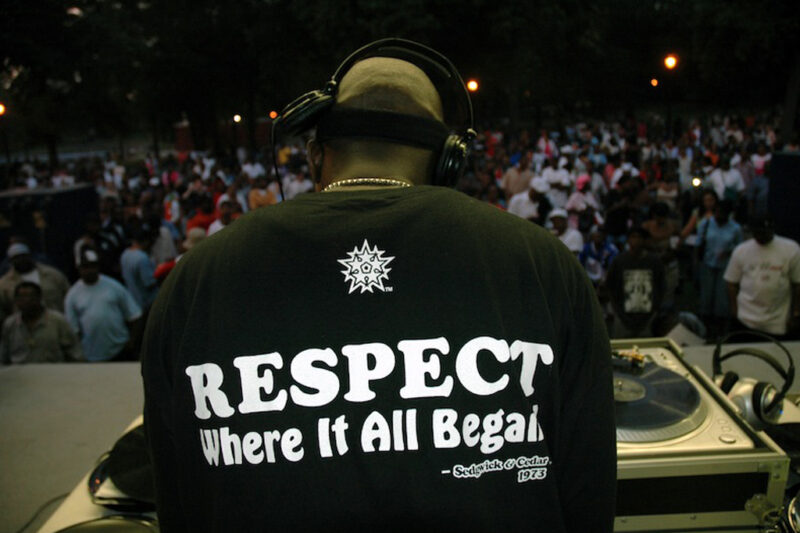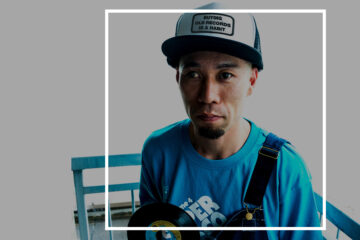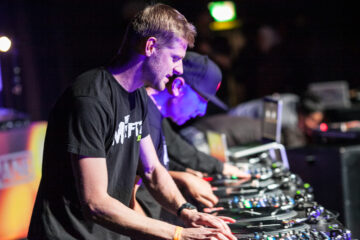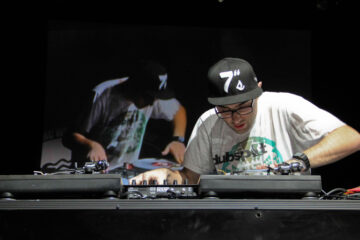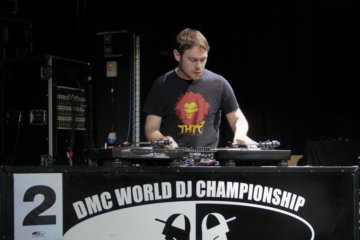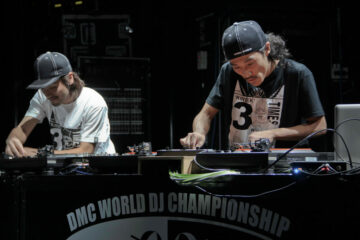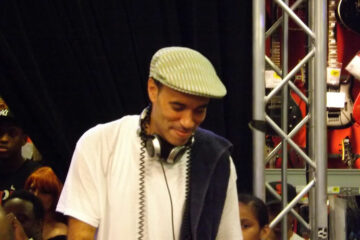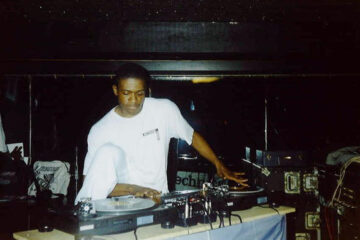Born in the mid-90s, Tools Of War (TOW) is a small frontier fighting to bridge this gap between a legendary past and the mainstream present. At the heart of TOW are Christie Z-Pabon and Jorge »Pop Master Fabel« Pabon. Christie positions TOW clearly in the tradition of Hip Hop »with the idea that there are many “tools” one can use in competing / battling within Hip Hop culture: turntables, microphones, paint«, etc. What had begun as a mail order in 1996, had quickly evolved to one of the most important newsletters for the worldwide Hip Hop community. This year, in 2012, they even celebrate the tenth anniversary of their notorious True School Park Jam series. These small block parties in the heart of NYC resurrect the vibe of the 1970s jams and attract many legendary DJs to share the turntables – including Biz Markie, Jazzy Jay, Grandwizard Theodore and Roc Raida (RIP). And you can be sure to always meet one of the most reknown Hip Hop photographers there, never ceasing to document the culture: Joe Conzo.
Time for an appraisal.
It’s Where You’re At
Jorge Pabon, also known as Pop Master Fabel, is one of the shapers of the Hip Hop culture. He began as a South Bronx B-Boy in the 1970s developing a particular love for Rock Dance.»Although NYC streets were dangerous, we still found ways to celebrate life through Hip Hop and other forms of urban culture«, Jorge describes the vibe in the early days. In 1984 he starred in the first commercial Hip Hop film »Beat Street«. Later on he became vice president of the legendary Rock Steady Crew, lecturer and choreograph and has just been crowned the Hip Hop Professor 2012 by the Village Voice.
Joe Conzo has also been at the source from the early days on. Different to Jorge though, he observed and documented the baby days of Hip Hop. Born in the Bronx his photos not only document a living, wild youth culture but also the social decay of New Yorker boroughs. His first contact with the uprising Hip Hop happened – of course – on a New York jam. »It must have been at The T Connection in 1979 in the North Bronx. That night I was simply hijacked by this massive mix of drums and bass, R&B and Disco.«
Christie Z-Pabon on the other hand came as a fan to Hip Hop. »Since I was young and living in Southwestern Pennsylvania at the time, it was simply hearing Sugar Hill Gang on the radio«, she confesses and anecdotely adds: »My friend Ronda and I went to all the Hip Hop / dance movies. Ironically, Beat Street never played in my area so I never saw my future husband in the movies when I was a teen!« Today, she is the driving force behind TOW. Besides that she organizes the DMC USA Championships as a one-woman show.
Just as Rakim ones truthfully proclaimed: »It’s not where you’re from, it’s where you’re at.« Christie, Jorge and Joe started at different points but they are all one: Hip Hop.
What does Hip Hop mean to you?»Although NYC streets were dangerous, we still found ways to celebrate life through Hip Hop and other forms of urban culture«
Fabel
Christie: I love the culture of Hip Hop because anyone can be involved in it – no matter what color, race, age, etc. I work within Hip Hop culture so I could say it is a big factor of my life. I dont consider it a religion or make it any more than it is. For me, I enjoy belonging to the Hip Hop community, locally, nationally and internationally, of true school heads = pioneers, legends, practitioners, promoters, enthusiasts.
Jorge: The fact that it originated as youth culture made Hip Hop very special. The Hip Hop movement, in the 1970s & early 1980s, was raw and real! All the elements were a lot more evident and present in the streets, parks and clubs. Hip Hop became popular because it was rebellious, revolutionary, highly competitive and self-empowering. It was, and still is, very fun and exciting!
Joe: Hip Hop was ours. It belonged to the youth of the Bronx and we have given it to the world. I had know Idea what I was documenting would become a global phenomena! I mean seeing it go from our playgrounds in the bronx and then citywide was amazing. An innocent time of young people of color making a statement of their environment using music they heard their parents played, pretty amazing!
What’s left from the vibe
Today the rawness of the beginning is merely a story, written in books by survivors like Jeff Chang and Dan Charnas, who reminisce over the history of a great youth culture in many lengths and details. For Jorge the Hip Hop culture has become a mixture of strong supporters and identity crisis. »Throughout the world, some people overstood it while others understood it. There are also individuals, as myself, who tried to preserve it while making a career with it as well.«
Nonetheless, Hip Hop has already become synonymous for Rap. The other elements of B-boying / B-girling, Graffiti and DJing have merely become marketing supplementaries in that context. For Christie, the distinction of the elements is crucial, especially since she is particularly interested in the graphic and DJ side of Hip Hop. »I work in Hip Hop – the culture and not the Rap industry«, she clarifies. »I focus primarily on the DJ element in my own work. Even the MCs I do work with – like GrandMaster Caz, Lord Finesse and Biz Markie are also DJs!«
What’s more important for a good battle DJ: skills, groove or guts?
Christie: All three are very crucial! You can be a great turntablist – but if you never battled – it is unlikely that you will ever showcase at a DMC US battle that I am organizing. I am not super technical. All I know is what sounds good, is musical and has flavor and who has a champion sound. If you watch most any DMC World Champ you will hear that champion sound and it is always so exciting!
Has anything changed?»he vibe was one on innocence and experimental. Fun would be a good word.«
Joe Conzo
Christie: The European DJs, especially, appear to be very advanced – scratch wise. I personally (not DMC) don’t think a DJ should get a pass without beat juggling too. One thing I don’t like…. there is a certain kind of electro-ish / generic dance music that many DJs use in the DMC World Finals that I really don’t like. I hope that DJs start using more recognizable music – so you can see how they changed it.
Has any new technique even been invented? That’s the boom that I am waiting for. Right now you have the major turntablist techniques of Scratching and what’s known as Beat Juggling. DJs have made advancements and/or new patterns, but no one has invented a 3rd major technique.
Are there comparable changes in B-boying?
Jorge: B-boying and B-girling went from dancing with flavor and finesse to more of a acrobatic art form throughout the years. Dancers began to focus more on the moves versus the movement. Within the past 15 years, dancers are finally starting to go back to the original recipe of style and finesse while also incorporating power moves and blow-ups.
What does the observer’s impression?
Joe: The vibe was one on innocence and experimental. Fun would be a good word. It depends where you go today but you can find the same vibe a a Tools Of War Concert, other events today are still corporate driven.
Alive & Kickin’
Tools Of War is the answer to the longing for a long-lost time. As Jorge explains, it is all about working »to preserve Hip Hop and urban culture.« In that regard, culture is more than music and party. It’s about a movement which forces change through artistic expression. It’s about communication. »We are also activists within the culture and support efforts towards peace, unity, equality and freedom through the arts. We encourage people to use Hip Hop components as a form of positive confrontation with artistic battles versus disrespect and violence.« The ultimate goal is togetherness. To foster this grand goal, TOW have been organizing (legal) park jams in New York communities since 2003. The jams are supported by companies like Serato and Rane which themselves are part of the movement. There are no merchandising booths, the entrance is free and the artists perform for the vibe. Behind the wheels of steel you’ll find master DJs like Grandmaster Flash, Afrika Bambaataa and Lord Finesse. In the many ciphers legendary b-boys like Crazy Legs and Pop Master Fabel meet their young successors. Charlie Ahearn, Joe Conzo, Res One and other photographers from all over the world drop by.
Is this the return of the raw vibe?
Christie: We, along with our legendary friends, made our best attempts to bring back the essence of the legendary park jams of from the 70s and 80s. A typical jam starts out with just us setting up sound, hanging banners, etc. Familiar faces pop up. The DJs get there, the music begins, and the crowd gets bigger and bigger. GrandMaster Caz is hosting. Fabel gets on the mic whenever he sees fit to help host or make announcements. You have the DJ fans who stand in front of the set. You have the fans and rivals of our main man: Superman and his sound. There are usually a few bboys there really early and the circles remain active most of the night. I don’t usually get to watch the dance circles since they are usually thick with spectators and it’s hard for me to break through to take a peek!!
Joe: That is what makes Tools of War so “REAL” cause its the same vibe from the early days of this culture Hip Hop! People come from all over the world each and every year to be apart of Tools Of War!
Jorge: I feel like a kid who is also a veteran in Hip Hop! Hip Hop culture contains the fountain of youth!

